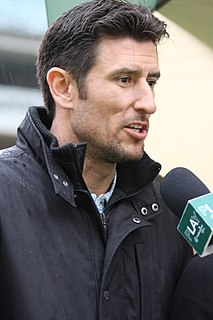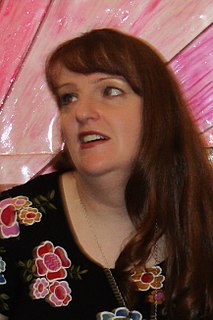A Quote by P. G. Wodehouse
He was a long, stripy policeman, who flowed out of his uniform at odd spots, as if Nature, setting out to make a constable, had had a good deal of material left over which she had not liked to throw away but hardly seemed able to fit into the general scheme.
Related Quotes
... everything seemed to him a uniform shade of gray- even the people! He had been unable to believe it could rain so much in one place, and so unceasingly. The damp had seemed to come up from the floors and into his bones, so that he'd thought he would eventually sprout mold, in the manner of a tree. "You do get used to it," he said "Even if sometimes you feel as if you out to be able to be wrung out like a washrag." p 311
You had every right to be. He raised his eyes to look at her and she was suddenly and strangely reminded of being four years old at the beach, crying when the wind came up and blew away the castle she had made. Her mother had told her she could make another one if she liked, but it hadn't stopped her crying because what she had thought was permanent was not permanent after all, but only made out of sand that vanished at the touch of wind and water.
Her thoughts ran away to her girlhood with its passionate longing for adventure and she remembered the arms of men that had held her when adventure was a possible thing for her. Particularly she remembered one who had for a time been her lover and who in the moment of his passion had cried out to her more than a hundred times, saying the same words madly over and over: "You dear! You dear! You lovely dear!" The words, she thought, expressed something she would have liked to have achieved in life.
Sharp knives seemed to cut her delicate feet, yet she hardly felt them, so deep was the pain in her heart. She could not forget that this was the last night she would ever see the one for whom she had left her home and family, had given up her beautiful voice, and had day by day endured unending torment, of which he knew nothing at all. An eternal night awaited her.
At that moment a very good thing was happening to her. Four good things had happened to her, in fact, since she came to Misselthwaite Manor. She had felt as if she had understood a robin and that he had understood her; she had run in the wind until her blood had grown warm; she had been healthily hungry for the first time in her life; and she had found out what it was to be sorry for someone.
In this moment she felt that she had been robbed of an enormous number of valuable things, whether material or intangible: things lost or broken by her own fault, things she had forgotten and left in houses when she moved: books borrowed from her and not returned, journeys she had planned and had not made, words she had waited to hear spoken to her and had not heard, and the words she meant to answer with. . . .
You'll have games where you're out there a long time. Being able to go through that and not get stiff was a good thing for me, ... As I went along, it felt better, and on that last play [a nifty move to his right and a throw across his body for the final out in the seventh] had a lot of body torque to it, and no problems.
Long ago, when Harry had been left alone while the Dursley's went out to enjoy themselves, the hours of solitude had been a rare treat: Pausing only to sneak something tasty from the fridge, he had rushed upstairs to play on Dudley's computer, or put on the television and flicked through the channels to his heart's content. It gave him an odd empty feeling to remember those times; it was like remembering a younger brother whom he had lost.
She had fallen asleep with her head on his arm, the clockwork angel, still around her throat, resting against his shoulder just to the left of his collarbone. As she moved away, the clockwork angel slipped free and she saw to her surprise that where it had lain against his skin it had left a mark behind, no bigger than a shilling, in the shape of a pale white star.
Pansy rolled over and went to sleep, but Petunia stayed awake long after Olga left, and long after Oliver crawled out from under the bed, grabbed some sandwiches, and slipped out the door. She hoped that he was going to Galen and Rose's room, and she hoped, too that he hadn't known she was awake when he had leaned over and kissed her hair. She wanted to savor that touch forever.
I suppose I'd had, by the standards of that pre-permissive time, a good deal of sex for my age. Girls, or a certain kind of girl, liked me; I had a car-not so common among undergraduates in those days-and I had some money. I wasn't ugly; and even more important, I had my loneliness, which, as every cad knows, is a deadly weapon with women. My 'technique' was to make a show of unpredictability, cynicism, and indifference. Then, like a conjurer with his white rabbit, I produced the solitary heart.




































